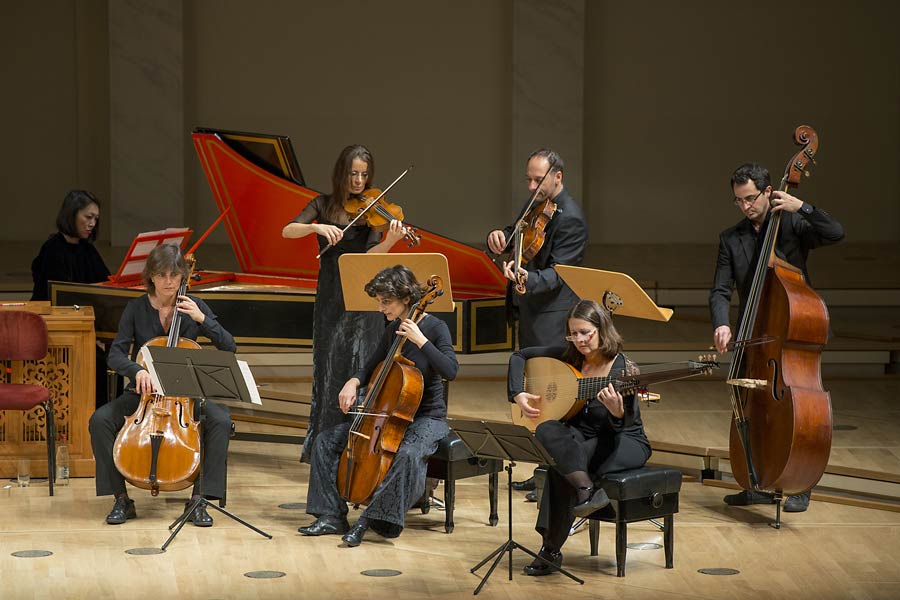When the first opera was presented in Florence in 1598 (Dafne by Jacopo Peri), no one could have guessed that in short time this private type of entertainment for narrow intellectual and artistic circles will become a common passion, or that the new form of spectacle combining drama and singing will usher in a new era in the history of culture. It happened so not only owing to the outstanding composers, who eagerly took on the then avant-garde musical form of opera, but also thanks to generous patrons. Competing for fame, they would at the same time create the economic basis for the development of arts.
Aside Florence, the most important early centres of opera were Mantua, home of Claudio Monteverdi, and Rome, where the clergy exercised their enlightened artistic patronage. They have supported the new musical genre despite initial doubts of theological nature: after all, the opera was perceived as a revival of ancient Greek drama which derived directly from pagan rituals. Very quickly, however, librettists managed to introduce Christian morality threads to traditional antiquity topics. For example in Orfeo, written under the Barberini patronage in Paris after the family was expulsed from Rome, Luigi Rossi leaves out a happy ending: the main protagonist copes with his suffering with a noble resignation worthy of a true Christian, awaiting the end of his days, since only death would join him back with his beloved Eurydice.
In the 1640s, Venice became the dominant opera centre, full of wealthy music patrons. New topics came to light. Praised was love of country (regardless of location, the word Patria always meant Venice) and debated was the devastating impact of earthly love on men who forget their duties as warriors and leaders. Venetian opera became more sensual, too. For the first time in history the term bel canto was used to describe beautiful, decorative, and therefore virtuoso singing.
Early opera abounds in great emotional scenes full of anger, grief, sadness, desire for revenge, but also of joy, serenity and fulfilment. They require a phenomenal control over voice, not only in fast melodies that render the turbulent feelings, but also in the long, sustained, lamenting notes. Philippe Jaroussky is simply perfect in this repertoire. French countertenor has both an extremely agile voice, able to perform the most daredevil coloraturas, and a taste and musicality that allows for thrilling performance of slow lyrical arias. Jaroussky, who will perform with Artaserse, an ensemble he founded himself, will by all means meet even the highest expectations.

Pietro Antonio Cesti (1623–1669) Sinfonia and Festeggia mio core! – Amicizio’s aria from Le Disgrazie d'Amore (Vienna, 1667)
Francesco Cavalli (1602–1676) Erme, e solinghe cime – recitative and Lucidissima face – Endymion’s aria from La Calisto (Venice, 1651)
Luigi Rossi (1597–1653) Lasciate averno – Orfeo’s lament from Orfeo (Paris, 1647)
Giovanni Antonio Pandolfi Mealli (1630–1670) II Sonata ‘La Cesta’ from Sonate… per chiesa e camera Op. 3 (Innsbruck, 1660)
Francesco Cavalli All’armi mio core – Brimante’s aria from La Statira, principessa di Persia (Venice, 1656)
Marco Uccellini (1603–1680) Sinfonia quinta a 5 from Ozio regio: compositioni armoniche sopra il violino e diversi altri strumenti (Antwerp, 1668)
Giovanni Legrenzi (1626–1690) O del Cielo ingiusta legge! – aria, Ove povero d'acque – recitative and O ristoro de' mortali – Giustino’s aria from Giustino (Venice, 1683)
Biagio Marini (1594–1663) Passacaglio a 4 from Per ogni sorte di strumento musicale diversi generi di sonate Op. 22 (Venice, 1655)
Luigi Rossi M’uccidetemi begl’occhi, e pur v’adoro – cantata
Agostino Steffani (1655–1728) Sorge Anteo più forte un core – Alarico’s aria from
Alarico il Baltha, cioè l’audace Ré de Gothi (Munich, 1687)
***
Marco Uccellini Sinfonia sesta a 5 from Ozio regio: compositioni armoniche sopra il violino e diversi altri strumenti
Claudio Monteverdi (1567–1643) Adagiati Poppea – recitative and Oblivion soave – Arnalta’s aria from L’Incoronazione di Poppea (Venice, 1643)
Francesco Cavalli
Sinfonia from L'Ercole amante (Paris, 1662)
Delizie, contenti – Giasone’s aria from Il Giasone (Venice, 1649)
Che città, che città – Nerillo’s aria from Ormindo (Venice, 1644)
Agostino Steffani (1655–1728)
Sinfonia from Marco Aurelio (Munich, 1681)
Ove son, chi m’aita? – recitative and Dal mio petto o pianti uscite – Anfione’s aria from Niobe, regina di Tebe (Munich, 1688)
Giovanni Legrenzi Trio Sonata ‘La Spilimberga’ from Sonate a due, e tre… Libro primo Op. 2 (Venice, 1655)
Pietro Antonio Cesti (1623–1669) Berenice, ove sei? – Polemon’s [czy Polemono’s – nie mogę znaleźć w Grove!] lament from Il Tito (Venice, 1666)
Agostino Steffani Gelosia, lasciam'in pace – Stilicone’s aria from Alarico il Baltha, cioè l’audace Ré de Gothi (Munich, 1687)
Philippe Jaroussky – countertenor
Ensemble Artaserse
